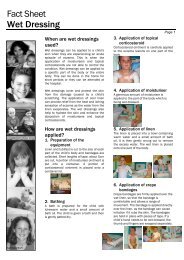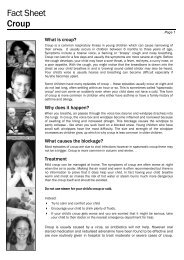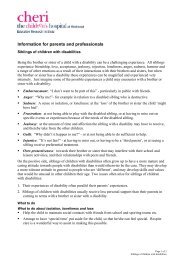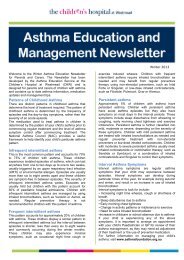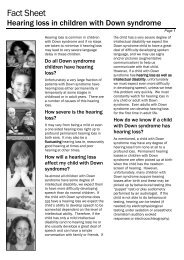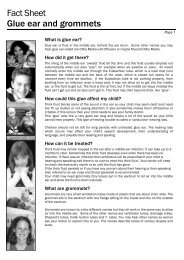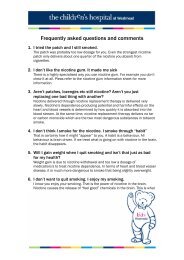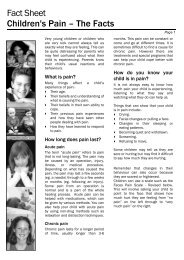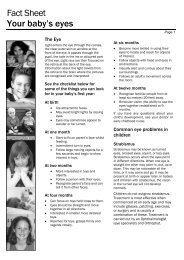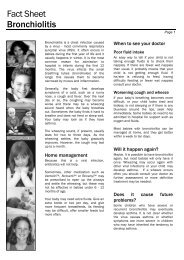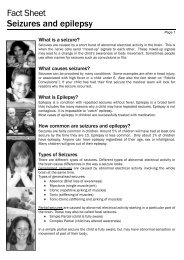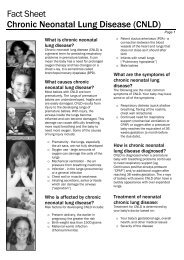Fact Sheet - Kids Health @ CHW
Fact Sheet - Kids Health @ CHW
Fact Sheet - Kids Health @ CHW
You also want an ePaper? Increase the reach of your titles
YUMPU automatically turns print PDFs into web optimized ePapers that Google loves.
<strong>Fact</strong> <strong>Sheet</strong><br />
Appendicitis<br />
xcvxcvxcv<br />
What is the appendix?<br />
The appendix is a coiled, eight to twelve<br />
centimetre tube attached to the caecum<br />
(the first part of the large intestine),<br />
usually located in the lower right side of<br />
the abdomen.<br />
What is appendicitis?<br />
Appendicitis is inflammation of the<br />
appendix. This can be caused by an<br />
infection or blockage of the appendix.<br />
With a blockage, the appendix can<br />
become swollen and easily infected by<br />
bacteria. If the diagnosis is delayed, the<br />
appendix can rupture. This results in<br />
peritonitis or the formation of an abscess<br />
around the appendix.<br />
What are the most<br />
common signs and<br />
symptoms of appendicitis?<br />
Abdominal pain that starts near the<br />
belly button, then moves to the right<br />
side.<br />
Fever.<br />
Vomiting.<br />
Page 1<br />
How can the doctor be sure<br />
it’s appendicitis?<br />
The diagnosis of appendicitis can usually<br />
be made by examining your child and<br />
discussing their symptoms. Blood tests,<br />
an ultrasound or other investigations<br />
may be done if the diagnosis is less<br />
certain. A period of observations in<br />
hospital is often more useful than tests.<br />
The diagnosis can be more difficult in<br />
younger children. Sometimes, the<br />
diagnosis isn’t suspected until the<br />
appendix has ruptured. In a small<br />
number of cases, the diagnosis is<br />
suspected but the symptoms prove to<br />
have another cause.<br />
Treatment of appendicitis<br />
The best treatment of appendicitis is<br />
removal of the appendix. The operation<br />
may be done through a single incision<br />
over the appendix or by laparoscopy<br />
(‘key hole’ surgery). Antibiotics are given<br />
at the time of the operation to reduce the<br />
chance of infection.<br />
About one in five children who have an<br />
operation for appendicitis turn out to<br />
have another cause for their pain. This<br />
has to be balanced against the risk of<br />
the appendix rupturing if the operation is<br />
unduly delayed. The surgical team will<br />
discuss the factors in the decision to<br />
operate in detail with you.<br />
What happens to my child<br />
before going to the<br />
operating theatre?<br />
Your child must not eat or drink (‘nil<br />
by mouth’) to have an empty<br />
stomach before the operation.<br />
Your child's condition is watched with<br />
regular observations of temperature,<br />
respirations, pulse and any changes<br />
in behaviour or level of pain.
<strong>Fact</strong> <strong>Sheet</strong><br />
Appendicitis<br />
xcvxcvxcv<br />
The doctor or nurse will explain the<br />
operation to you.<br />
Your child may be given intravenous<br />
fluids.<br />
A nasogastric tube (a tube through<br />
the nose to the stomach to keep the<br />
stomach empty and prevent<br />
vomiting) may be used.<br />
Any other treatment needed before the<br />
operation will be explained by the<br />
doctors and nurses looking after your<br />
child. You should feel free to ask<br />
questions at any time.<br />
What happens after the<br />
operation?<br />
Your child is watched hourly for four<br />
hours, then as often as is necessary<br />
depending on his/her condition.<br />
The wound is checked regularly.<br />
Some pain is expected after the<br />
operation, but medicines are given to<br />
relieve pain and will be explained to<br />
you. Antibiotics will be continued<br />
intravenously if the appendix was<br />
ruptured.<br />
Usually drinks, followed by food can<br />
be started the next day. This may be<br />
delayed if the appendix was ruptured<br />
or your child is nauseous or vomiting.<br />
Meanwhile, fluid is given through a<br />
drip to avoid dehydration.<br />
The Hospital stay is usually two to<br />
four days, but may be longer if the<br />
appendix was ruptured.<br />
Page 2<br />
Prevention<br />
There are no medically proven ways to<br />
prevent appendicitis.<br />
Remember<br />
Children with appendicitis can<br />
deteriorate quickly.<br />
If you suspect appendicitis, go to<br />
your family doctor or local hospital<br />
without delay.<br />
Feel free to ask any questions of the<br />
doctors and nurses caring for your<br />
child.<br />
This fact sheet is for education purposes only.<br />
Please consult with your doctor or other health professional<br />
to make sure this information is right for your child. This document was reviewed on 29 th July 2009.<br />
www.chw.edu.au www.sch.edu.au www.kaleidoscope.org.au<br />
© The Children’s Hospital at Westmead, Sydney Children’s Hospital, Randwick & Kaleidoscope * Hunter Children’s <strong>Health</strong> Network 2005 – 2009



